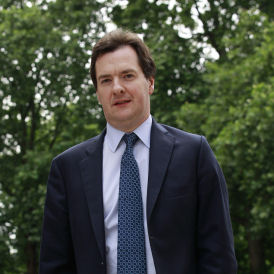IMF backs George Osborne’s spending cuts plan
The IMF endorses George Osborne’s plans for getting the UK economy back on its feet and expects to see “moderate growth” this year, despite the slowdown at the end of 2010.

The International Monetary Fund (IMF)‘s acting Managing Director, John Lipsky, said the Coalition’s economic strategy “remains appropriate” despite economic growth “flattening” in recent months.
The organisation’s support for George Osborne‘s deficit reduction programme will be a boost for the Chancellor, who was attacked at the weekend by a group of leading economists who say he needs a “plan B” rather than pushing on with cuts.
In a letter to The Observer, the academics describe the Coalition’s “breakneck deficit-reduction plan” as “self-defeating”.
Mr Lipsy’s backing for the Chancellor also came despite a slowdown in the UK’s economic recovery. GDP shrank by 0.5 per cent in the last three months of 2010, then only grew by 0.5 per cent in the first three months of 2011, leaving the economy no bigger than it was last September, and lagging behind other countries.
This raises the question whether it is time to adjust the macro-economic policies. The answer is no as the deviations are largely temporary. IMF’s John Lipsky
But Mr Lipsky described the issues as “headwinds” and “temporary deviations”, saying there would be economic growth for the UK in the medium-term.
He said: “Aided by the implementation of a wide-ranging policy programme, the post-crisis repair of the UK economy is under way.
“However, the weakness in economic growth and rise in inflation over the last several months was unexpected. This raises the question whether it is time to adjust macro-economic policies. The answer is no as the deviations are largely temporary.”
He said that strong fiscal consolidation in the UK “remains essential to achieve more sustainable budgetary position, thus reducing fiscal risks”.
Growth in 2011
The organisation still expects the UK economy to grow this year, according to Mr Lipsky.
“Looking ahead, we expect the economic recovery to resume in 2011, albeit at a moderate pace,” he said.
The IMF’s forecast for growth this year is now 1.5 per cent, downgraded from an earlier forecast of 2 per cent. However he said this mainly reflected the slow growth seen at the beginning of the year, which would drag down more robust growth of 2 or 2.5 per cent which the IMF expects to see “in the medium term”.
A soft housing market, fiscal consolidation and the process of repairing the UK banks will continue to weigh on growth, the IMF said. But private investment and stronger net trade – when exports outweigh imports – should help buoy the overall economic recovery.
He said the IMF also expects UK inflation to remain at 4 per cent for most of 2011 – but will then decelerate to nearer to 2 per cent.
Responding, the Chancellor said he welcomed the IMF’s report.
“Difficult decisions on tax and spending inevitably generate opposition and lead some to argue that there is an easier way. The IMF expert team have spent two weeks here engaging with all shades of opinion, including those who have been calling on us to change course.
“The IMF have publicly asked themselves the question ‘whether it is time to adjust macroeconomic policies’ – in other words, is it time to change course? And they have concluded definitively that the answer is no,” Mr Osborne said.
It is the second time the IMF has backed the Coalition’s spending cuts-led deficit reduction programme. In November 2010, the organisation gave George Osborne an official slap on the back for his proposals after he outlined his strategy in the Comprehensive Spending Review.
Mr Lipsky also tackled the issue of the UK banking sector, saying their balance sheets were recovering but that vulnerabilities remained.